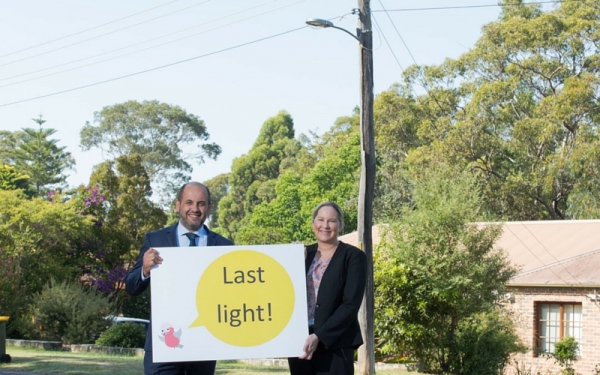The biggest LED street light replacement project in NSW, Light Years Ahead, has come to an end with the last light installed in March.
Crews installed 13,951 LED street lights across Western Sydney – 951 extra lights than originally forecasted. Final reporting is underway and Western Sydney Regional Organisation of Councils (WSROC), who is coordinating the project, is investigating options for additional lights.
Nine Western Sydney councils have been working on this collaborative street lighting project since 2014. Councils involved in the project are Blacktown, Blue Mountains, Fairfield, Hawkesbury, Hills Shire, Holroyd, Liverpool, Parramatta and Penrith.
 |
|
WSROC President Cllr Tony Hadchiti and Light Years Ahead Project Manager Michelle Playford near one of the final LED street lights. (Photo courtesy of Jay La Photography) |
The project is estimated to save the participating councils AU $20 million (US $14.7 million) and 74,000 tonnes of carbon dioxide emissions over 20 years. The $20 million savings are significant as street lighting makes up around 55% of councils’ energy costs. The emission savings are equivalent to taking 37,000 cars off the road each year over a 20 year period.
Endeavour Energy crews began installing LED lights in May 2014 in Werrington County, a suburb of the Penrith local government area. By the mid-March 2016 crews changed 13,951 mercury vapour street lights with the last light installed in Winmalee in the Blue Mountains.
LED lights have been installed in 140 136 suburbs [see references for correction]. The full list of suburbs included in the project is at http://lightyearsahead.com.au/lighting-roll-out. The number of LEDs installed is nearly 11% of the total 126,955 street lights in the nine councils. These new lights join other LED street lights installed by Endeavour Energy outside of the project.
WSROC President, Cllr Tony Hadchiti, said, “It’s a great time for WSROC and our councils. It’s always satisfying to announce a major milestone on project. Light Years Ahead is a great precedent for future LED lighting projects and more generally, for other council-initiated infrastructure upgrades in Western Sydney.”
At the many community events and launches attended by Light Years Ahead staff, residents discussed their energy-saving actions, solar hot water and other systems, and a desire to increase their renewable energy capacity. This anecdotal evidence is reflected in Australian data related to energy consumption and solar technology adoption. Between 2013 and 2014 there was a 4% reduction in the energy consumption of the residential sector [footnote 1]. As of October 2015, 17% of Australian homes had solar photovoltaics (PV’s) installed [footnote 2].
Cllr Hadchiti stated, “It is clear that our residents support Western Sydney councils’ energy-saving initiatives including this project. Residents have been installing solar in their homes for some years now. They have heard the messages. They are watching their energy usage, upgrading appliances and doing what they can within their own household budgets – whether they are owner-occupiers or tenants.”
He continued, “This project provides an excellent example of how councils can work together with the Australian Government to successfully implement projects that minimize energy consumption and costs, reduce greenhouse gas emissions and deliver broader benefits to the community.”
Recycling has been a major consideration of the project. Most of the components of the old mercury vapor street lights are being recycled. The plastic street light visors and ‘bodies’ are the major components to be recycled.
Endeavour Energy crews took the components back to a depot in Western Sydney. Once at the depot, the waste was sorted and then packed for transportation to another recycling facility, also in the region. In the second facility the components were loaded to a converter belt with bailing machine (informally known as a crusher). Once crushed, the lights were bound into a cube form, secured and then shipped to another facility overseas. At the next waste facility the crushed components are to be converted into a fine pellet form. These pellets will be sold to businesses who can melt then reshape the substance into acrylic-based products including common household acrylic paint or plastic brochure stands often found on reception desk counters.
The WSROC President noted, “Nine bags, weighing around 630 kilogram per bag, have been sorted, compacted and sent to the next stage of recycling. These eight bags equate to over five and a half tonnes of waste. That’s over 5,040kg diverted from landfill.”
The Light Years Ahead project received funding of $5.3 million from the Australian Government and $2.6 million in funding provided by the nine participating councils. The project formally concludes in May 2016.
For more information visit www.lightyearsahead.com.au
References
-
Energy in Australia 2015 (2016), Department of Industry, Innovation and Science, page 43 - http://www.industry.gov.au/Office-of-the-Chief-Economist/Publications/Pages/Energy-in-Australia.aspx
-
Energy in Australia 2015 (2016), Department of Industry, Innovation and Science, page 49 - http://www.industry.gov.au/Office-of-the-Chief-Economist/Publications/Pages/Energy-in-Australia.aspx












